#Calvin and Hobbes dancing >>>>>>>
Explore tagged Tumblr posts
Text

1K notes
·
View notes
Text

23 notes
·
View notes
Text

happy threshold day to all who celebrate!
#star trek voyager#threshold day#happy birthday salamander babies#captain janeway#tom paris#if it looks familiar its inspired by calvin and hobbes dancing#not the best colorist but if you want to color it be my guest#may color later? i like it enough to post for now lol
21 notes
·
View notes
Text

Good Omens S2 ep. 1, 2023
#calvin and hobbes#it’s a crime we didn’t get to see Aziraphale’s apology dance#what was he apologizing for in 1793 and 1941#good omens season 2 spoilers#good omens season 2#aziraphale#Crowley#what really got me is how genuinely mad they both looked during the apology dance sequence
180 notes
·
View notes
Text
Saturday linkdump, part the sixth
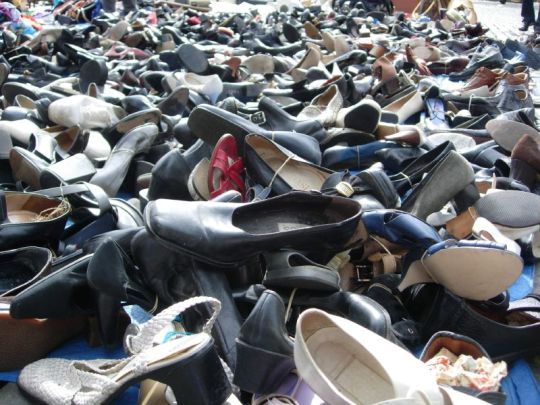
On September 12 at 7pm, I'll be at Toronto's Another Story Bookshop with my new book The Internet Con: How to Seize the Means of Computation.
On September 14, I'm hosting the EFF Awards in San Francisco.

I usually write this blog 5-6 days/week, but every now and again, I take a break, and when I do, I get massive link backlogs of stuff I want to write about, but lack the time to address in depth. When that happens, I turn my Saturday edition into a linkdump. Today, I present the sixth in the series – here's the other five:
https://pluralistic.net/tag/linkdump/
Why was I offline and away from my blog? I went to the dirt rave. Yes, I was one of the 70,000+ people stuck in the mud at this year's Burning Man, and when I emailed my editor at the New York Times to say I might be late on the op-ed I was working on, she asked me to write about what this year's mud crisis meant:
https://www.nytimes.com/2023/09/06/opinion/burning-man-flood-playa-climate-change.html
tl;dr:
Bad weather is normal at Burning Man (it's a feature, not a bug);
Mostly burners leapt to the occasion, which is what people almost always do in disaster situations;
This is the second Burning Man heavy weather year in a row;
The climate emergency is tipping the Black Rock Desert from "extremely challenging" to "impossible";
This isn't the last event, place and tradition that will have to be radically reconsidered in light of the climate emergency;
But now I'm home, in my hammock, with all the laundry done – just in time to leave again. I'm about to head back to my hometown of Toronto for a book launch. The Internet Con, my latest nonfiction (from Verso Books) came out last week, and I'll be appearing at Another Story Bookshop on Tuesday:
https://anotherstory.ca/events/29283
Internet Con is a "Big Tech disassembly manual." It explains how Big Tech got so big (lax anti-monopoly enforcement, which led to regulatory capture, which let Big Tech abuse our privacy, labor rights, and consumer rights), and how we can use interoperability so it's no longer Too Big to Fail, nor Too Big to Jail:
https://www.versobooks.com/products/3035-the-internet-con
You can read a long excerpt from the book in Wired, which lays out some of the shovel-ready legislative, regulatory and technical proposals that are the book's main purpose:
https://www.wired.com/story/the-internet-con-cory-doctorow-book-excerpt/
You can also hear me read the whole introduction and first chapter of the audiobook on my podcast:
https://craphound.com/internetcon/2023/08/01/the-internet-con-how-to-seize-the-means-of-computation-audiobook-outtake/
That comes from the audiobook, a DRM-free, independent edition that I financed, produced and narrated myself. You can get the audiobook everywhere except Audible, Apple Books, and Audiobooks.com, all of which have mandatory DRM policies. You can also get it direct from me:
https://transactions.sendowl.com/products/78992826/DEA0CE12/purchase
The DRM-free ebook is available everywhere ebooks are sold (Kobo, Kindle, Nook, etc), as well as in my own DRM-free ebook store:
https://transactions.sendowl.com/products/78992801/9C4FC2B8/purchase
Verso's books are sold in bookstores around the world; you can support your local bookseller by buying it through Bookshop:
https://bookshop.org/p/books/the-internet-con-how-to-seize-the-means-of-computation-cory-doctorow/18771891?ean=9781804291245
If you'd like a signed copy, there's stock at Book Soup:
https://www.booksoup.com/book/9781804291245
Now, it was inevitable that I would do a book event for Internet Con in Toronto – I've never had a bad event there, and I love my hometown – but the timing of this event was driven by a non-book-related factor. Talking Heads is appearing together at TIFF, to support the re-release of Stop Making Sense, the greatest concert film in human history:
https://pluralistic.net/StopMakingSense
People often ask me what my favorite book is, and I always tell them that you should never trust people who have one favorite book, as it inevitably turns out to be The Bible, The Fountainhead, or Mein Kampf. But while I don't have a favorite book, I have a clear and unambiguous favorite band.
If I was forced to listen to no music other than Talking Heads for the rest of my life, I would be perfectly happy. Ecstatic, even. Throw in David Byrne, Tom Tom Club and Casual Gods and I probably wouldn't even notice anything missing.
There's a running joke among my Burning Man campmates that whenever I'm in charge of the music, I'm just shuffling Talking Heads rarities, and whenever someone puts on anything else, I demand to know which Talking Heads album it came from. Which is all to say: I have tickets for the Talking Heads event at TIFF and I could *not be more excited.*
Continuing on the Canadian theme, one of the annual highlights of Canadian media is the Massey Lectures, a series of public lectures given around the country and rebroadcast on CBC. These are always great, but recent years have been superb – Ron Deibert's 2020 series was unmissable:
https://pluralistic.net/2020/11/10/dark-matter/#citizenlab
This year's Masseys are shaping up to be the GOAT. They're presented by Astra Taylor, an activist rock-and-roller turned documentary filmmaker who is one of the founders of the Debt Collective, fighting for student debt cancellation. Everything Astra does is amazing and her profile on CBC Ideas gives some background on the role that unschooling played in making her the powerful activist she is today:
https://www.cbc.ca/radio/ideas/astra-taylor-interview-2023-massey-lecturer-1.6959320
There's no question that things are messed up right now, but Astra and people like her shine out like beacons of hope. 17 years ago, self-described "democracy nut" Tom Stites gave one of the seminal lectures on the role news media play in democracy:
http://citmedia.org/blog/2006/07/03/guest-posting-is-media-performance-democracys-critical-issue/
17 years later – and from his perch as editor at the essential International Consortium of Investigative Journalists – Stites presents us a long-overdue, extremely pertinent followup: "Building Civic Energy is the Goal, Not Saving Old News Business Models":
https://banyanproject.coop/wp-content/uploads/2023/09/Hope-College-speech-for-Banyan-website-1.pdf
Stites's intervention is extremely timely, because policymakers all over the world have made the mistake of thinking that Big Tech is stealing the news media's content, which is absolutely untrue. It is good, actually, to index news stories and let people discuss, quote from and link to news stories. News you're not allowed to talk about isn't news, it's a secret.
But Big Tech is stealing from news. They're not stealing content – they're stealing money. The Google/Apple duopoly rakes 30% off every subscription payment collected in an app. The Google/Meta duopoly rakes 51% out of every ad-dollar (and maintain that death-grip through creepy, privacy-invading surveillance ads). Meta and Twitter hold social media subscribers hostage, forcing publishers to pay to reach their own subscribers.
We don't want the news to be Big Tech's partners – we need them to be Big Tech's watchdogs. "Link taxes" and other profit-sharing arrangements between the media and tech cut against the civic energy Stites wants to build.
(You can read more about this – along with policy prescriptions for halting Big Tech's rent-extraction from the news – in "Saving the News From Big Tech," my EFF white-paper:)
https://www.eff.org/deeplinks/2023/04/saving-news-big-tech
If your spirits are lifted by stories of principled activists achieving important – and improbable – victories, you could do worse than to attend the EFF Awards on in San Francisco Sept 14 (I'm the emcee). This year, we're honoring Alexandra Elbakyan for her founding of Sci-Hub, the Library Freedom Project and the Signal Foundation:
https://www.eff.org/awards/effawards/2023
In more activist news: Mozilla produced a startling and astoundingly good – if demoralizing – report on the state of digital privacy and security in the automotive sector:
https://foundation.mozilla.org/en/privacynotincluded/articles/its-official-cars-are-the-worst-product-category-we-have-ever-reviewed-for-privacy/
Entitled, "It’s Official: Cars Are the Worst Product Category We Have Ever Reviewed for Privacy," the report reveals just how absolutely terrible the automotive sector is when it comes to privacy practices, collecting (and selling) (and giving away) information about your sex life, your geneology, your genetic characteristics, and your smell (no, seriously).
Their recommendations for which new car you should buy boil down to "don't buy a new car." I have been urging consumer research groups to release a report like this for a decade. There are whole categories of gadgets – like, say, "smart speakers" – that are unsafe at any speed. At a certain point, reviewers need to have the guts to say that every manufacturer in an entire sector is a dumpster fire and they should all be dragged in front of a firing squad – or at least a Congressional committee.
Cars, after all, are nightmares of privacy invasion and rent-extraction, the source of autoenshittification on a massive scale, a mobile form of technofeudalism:
https://pluralistic.net/2023/07/24/rent-to-pwn/#kitt-is-a-demon
The fact that cars score so badly on privacy is especially ironic given the campaign Big Car waged against the 2020 Massachusetts Right to Repair ballot initiative, in which car manufacturers held themselves out as the defenders of driver privacy from unscrupulous third parties who couldn't be trusted to handle the vast troves of data your car collects with every hour that God sends:
https://pluralistic.net/2020/09/03/rip-david-graeber/#rolling-surveillance-platforms
This is a familiar refrain: monopolists often claim that any check on their absolute authority over their users will expose those users to privacy risks. Apple has run a global ad-campaign claiming this, and while Apple does prevent Facebook from spying on iPhone owners, they also secretly spy on those customers in exactly the same way that Facebook used to, and lie about it:
https://pluralistic.net/2022/11/14/luxury-surveillance/#liar-liar
It turns out that giant companies just aren't good proxies for their customers' interests, and that the power they amass through monopolization shouldn't be counted on as a source of user safety. Monopolists won't reliably defend user privacy – that job belongs to democratically accountable regulators. That's an argument I developed in detail with Bennett Cyphers in our EFF white-paper "Privacy Without Monopoly":
https://www.eff.org/wp/interoperability-and-privacy
That is, rather than getting privacy by "voting with your wallet," you need to get it by voting with your ballot. "The market" is an election that you vote in with dollars, which means that the people with the most dollars always win. When there are zero cars on the market that are safe to drive, you can't vote with your wallet by buying a good one.
On a related subject, the DOJ Antitrust Division has brought the most important tech anti-monopoly case of the century, charging Google with monopolizing search:
https://www.nytimes.com/2023/09/06/technology/modern-internet-first-monopoly-trial-us-google-dominance.html
Part of the DOJ case turns on the fact that Google goes to extraordinary lengths to keep you from every trying another search engine, paying out more than $45 billion every year to be the default search on every device, program and service you might use. In other words, Google spends entire Twitter's worth of dollars every year, lighting it on fire to keep you from finding out about rivals.
Google argues that this is fine, actually, because these are only defaults, and users can dig through their settings to change their search engine. Sure, Google – and the first 20 search results you serve are only defaults, and it wouldn't matter if you were ordered to put them ten screens down, because users could always scroll to see them.
But search defaults aren't the only way that Google locks in searchers – and then harms us by invading our privacy. Google's ubiquitous Chrome browser ties Google's search to Google's invasive, nonconsensual, total surveillance. Chrome turned 15 this year and Google made a huge PR splash out of the anniversary:
https://blog.google/products/chrome/google-chrome-new-features-redesign-2023/
But all that puffery conspicuously failed to mention that Google had quietly rolled out its long-discredited, new surveillance technology, FLOC, which it pretended to kill in 2021:
https://pluralistic.net/2021/04/22/ihor-kolomoisky/#not-that-competition
FLOC is back, rebranded as the Topics API: this is a system for spying on you so advertisers can target you. Google is spinning this as a privacy improvement because it might someday replace "third party cookies," one of the creepiest web surveillance systems.
But as Ron Amadeo writes for Ars Technica, Chrome is the last major browser to support third party cookies – both Safari and Firefox block them by default. So Google is basically saying, "We are going to improve your privacy by changing how we spy on you, even though all our competitors don't do this kind of spying at all":
https://arstechnica.com/gadgets/2023/09/googles-widely-opposed-ad-platform-the-privacy-sandbox-launches-in-chrome/
This kind of gaslighting, where Google pisses in all our mouths and tells us it's raining, is the hallmark of a decrepit, arrogant, crapulent monopolist that needs to be shattered in the courts. Kudos to the DoJ for doing the people's business here – and kudos to DoJ antitrust boss Jonathan Kanter for promising that he will not go into corporate law when he finishes his stint in government.
The DoJ isn't the only public agency that's serving the American people. The FCC just announced proceedings to force cybersecurity labels for "smart" devices:
https://www.fcc.gov/consumer-governmental-affairs/fcc-proposes-cybersecurity-labeling-program-smart-devices
This is long overdue, and it's a welcome action from the FCC, which was hamstrung for years because cowardly Democratic senators joined with homophobic, libelous Republicans in blocking confirmation hearings for the amazing Gigi Sohn:
https://pluralistic.net/2022/12/15/useful-idiotsuseful-idiots/#unrequited-love
After years of abuse, Sohn bowed out. Now, Anna Gomez has been confirmed to fill that fifth FCC chair, turning the FCC into a fully operational battle station:
https://www.fiercewireless.com/wireless/senate-votes-approve-anna-gomez-5th-fcc-commissioner
The fact that there's all this great stuff going on in the administrative branch is easy to lose sight of amidst the circus of federal electoral politics, in which Donald Trump has retained his role as ringmaster and chief distractor.
Thankfully, we have expert Pantsless Emperor skewerers like Ruben Bolling around – his latest Tom the Dancing Bug revives his brilliant Calvin and Hobbes-inspired Trump gag:
https://boingboing.net/2023/09/06/tom-the-dancing-bug-a-calvinesque-and-hobbesian-look-at-taking-a-mug-shot.html
Well, that's me signing off for the weekend – I've got to pack for my flight to Toronto. If you're looking for more weekend fun, check out the trailer for Fractured Veil, the video game my old pal Chris DiBona has been working on for seven years and which is heading for Steam early access next month:
https://www.youtube.com/watch?v=NjNd3QQnENU
Just watch it. I mean. Wow.


If you'd like an essay-formatted version of this post to read or share, here's a link to it on pluralistic.net, my surveillance-free, ad-free, tracker-free blog:
https://pluralistic.net/2023/09/09/nein-nein/#everything-is-miscellaneous

Image: Roel Schroeven (modified) https://www.flickr.com/photos/roelschroeven/45413895
CC BY-SA 2.0 https://creativecommons.org/licenses/by-sa/2.0/
#pluralistic#calvin and hobbes#mozilla#privacy#automotive#autoenshittification#enshittification#saving the news from big tech#privacy without monopoly#tom the dancing bug#ruben bolling#astra taylor#canada#cbc#munk lectures#democracy#political science#google#surveillance#monopoly#floc#topics api#chrome#chromium#browser wars#games#fractured veil#fcc#iot#internet of shit
142 notes
·
View notes
Text
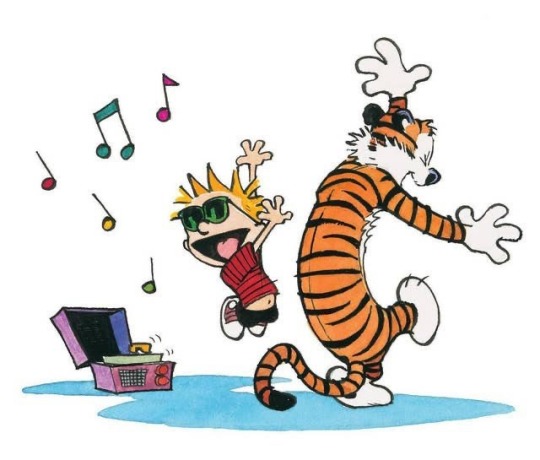
61 notes
·
View notes
Text

5 notes
·
View notes
Text

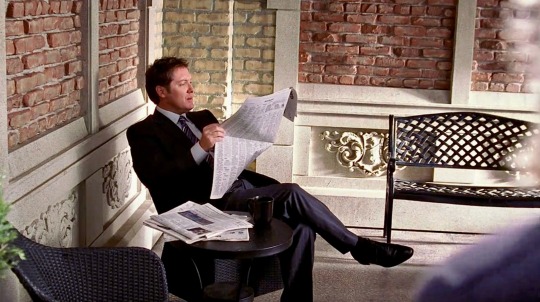
They don’t show it much I think he only goes out there once or twice but the little patio off Alan’s office is so cute… his enclosure for reading comics and talking about cannibalism
#I didn’t get a screengrab of it but he really is reading the funny pages here. I bet he loves calvin and hobbes :)#alan shore#I could spend 100000 hours thinking of little scenarios#but like. imagine you’re talking in his office and it starts snowing the first snow of the season and you love snow#so you go stand on his little patio balcony on the 14th floor. he thinks it’s silly he’s never paid the weather much mind it’s just there#but he watches you look out at the skyline and there are little snowflakes falling in his hair and the wineglass he’s holding and he smiles#and the office holiday party is next week so he puts his drink down and comes up behind you and says we should practice. and dances with you#which is even sillier than the snow. but there are snowflakes in his eyelashes the cold makes his cheeks rosy your breath clouds together#uh. who tf said all that. embarrassing
15 notes
·
View notes
Text

01-04-24 | misterlemonztenth.tumblr.com/archive
#misterlemonztenth#original post#humor#popular#.gif#digital art#animation#cartoon#dancing#calvin and hobbes
14 notes
·
View notes
Text

8 notes
·
View notes
Photo
@rubykgrant
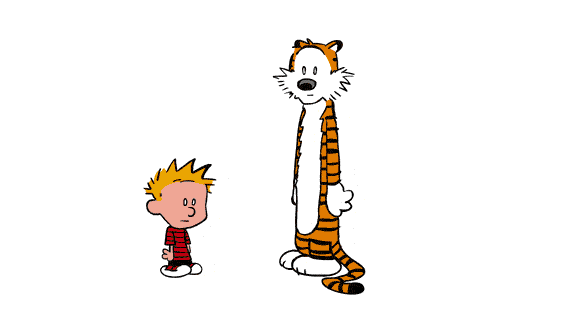
32K notes
·
View notes
Text
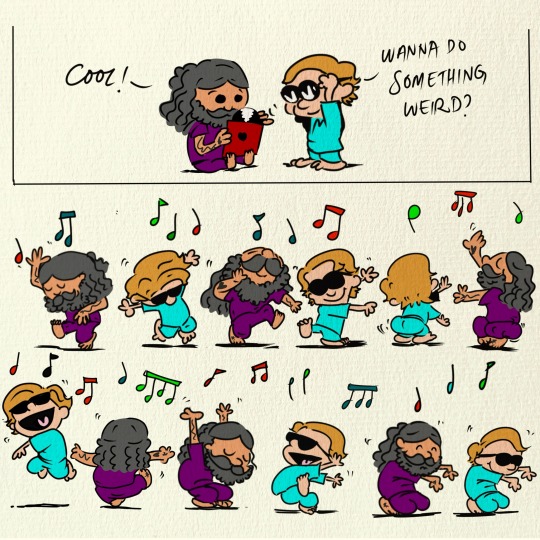
the deleted dancing scene, David told me so himself (Ed and Stede as Calvin and Hobbes)
#ofmd#our flag means death#ofmd fanart#blackbonnet#gentlebeard#Stede bonnet#Ed teach#Edward teach#Calvin and Hobbes#calvin & hobbes#enjoyyyy 😎#my art#classics redraw#ch redraw
951 notes
·
View notes
Text

oh noooo now you guys know wht art program i use,,,,, who cares /e dance
based upon this calvin and hobbes panel:

yes i know its a tumblr screenshot blah blah blah i use pinterest a lot
#🐾.exe#i love animating !!!!!#<- lie#gimmick blog#kiraboss#yoshikage kira#kira yoshikage#diavolo#jjba#gimmick account#gif warning
27 notes
·
View notes
Text
Let's take a look at the ninth art...
Given Asterix and Obelix has been getting popular again, I thought I'd do something I wanted to quickly write down for a long time - some posts to introduce those unfamiliar with to the world of... BD!
"BD"? Bande-dessinée. The French word we use for what Americans call "comic books" or "comics" or "graphic novels". Technically speaking, BD can cover the entirety of European comics production, but traditionally people refer to the "Franco-Belgian BD", "la BD franco-belge", as the heart of the European production was formed out of the industrial duo of France and Belgium.
Now, why would you or I use this obscure non-English term "BD" or "bande-dessinée"? Why not just say "European comics" or "French comic book"? Well... Why do you use "manga" and not "Japanese comic"? That's the same thing. Bande-dessinée works a lot like the American comics yes, and in fact, when I took a class at university about the history of BD, the teacher kept referring the theories of Will Eisner and Scott McCloud - BD, like comic books, are two manifestations of the "sequential art" as a whole... However, BD has a very different publishing process, a different historical evolution, a different social reception and cultural context than comics, and so it earns the right to have a specific denomination to separate it from American comics, the same way Japanese mangas are called "mangas". In fact, manga, comics and BD form the holy trinity of the sequential art, the three main manifestations of this specific medium - on one side Batman, Calvin and Hobbes, the Marvel comics ; on the other One Piece or Akira, and in the middle Tintin and Asterix and others...
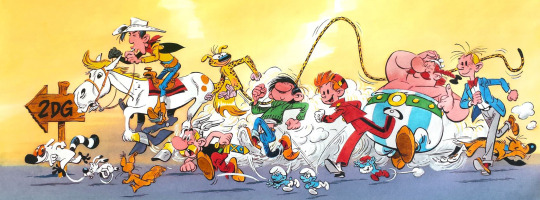
BD received various other names, from the derogatory to the glorifying.
A derogatory name? "Petits mickeys" (small mickeys), alternatively spelled "petits miquets" (small miquets, a francization of the term apparently from Pascal Oury). This term, from the 60s and 70s, was used to refer to BDs under the angle of low-quality, of "popular", "low" works. "To draw little mickeys, to read little mickeys, to make little mickeys". The term was also used, in a lovingly ironic way, out of self-mockery, by various BD creators such as Goscinny or Gotlib (today you can hear people say this term is tied to the Pilote and Fluide Glacial generations, 60s-80s). Some wonder if it isn't Sempé who made the term "mainstream", through humoristic drawings he made showing how people asked him if he was the one draing "little mickeys". Of course, this is an obvious reference to Mickey, the character from Disney, but it isn't just some sort of "Americanization" thing... The reason Mickey became associated with BD was due to "Le Journal de Mickey" (a famous French comic-magazine), which has been in France one of the historical outlets for introducing and developing the BD in France. But as a result, it led to the perception of BDs as simple stories, as childish things aimed at a young audience, and at "Mickey-adjacent" (and thus Disney-adjacent) products.

A glorifying term? Le neuvième art, "the ninth art". This famous and common denomination (which ranks the BD production to the rank of "art") is based, not on the "seven arts" of the Middle-Ages, but rather on a different system of art classification... You see, in the 19th century, a certain "art hierarchy" was popularized (by Hegel). It deemed that there were five main arts, which in rank of importance were architecture, sculpture, painting, music and poetry. However, after Hegel's classification became popular many authors and thinkers started to add their own arts - in the 1920s, Ricciotti Canudo notably added the "sixth art" (dance) and the "seventh art" (cinema). Though not everybody agreed on what was what - for example, while today the sixth art is "dance", for quite some times it was "photography". And while Canudo added the sixth and seventh art, he had his own concept of the five arts - for him it was poetry, music, theater, plastic arts and eloquence/rhetoric.
Anyway, BD soon became the "ninth art". Morris (creator of the "Lucky Luke" series) and Pierre Vankeer wanted to officially call BD the "eighth art", but they discovered the term was already taken - Roger Clausse used it for radio in the 1940s, but it quickly became a common term for television as a whole and englobed within itself photography... So, Morris-Vankeer chose the "ninth" art for BD and, in a strange coincidence, on the very SAME year Morris-Vankeer published their denomination of "ninth art" (1964), Claude Beylie published his own article deemed BD the "ninth art". (And also, little historical trivia, the term existed by the 1920s but it was to designate gastronomy, and it never took off).
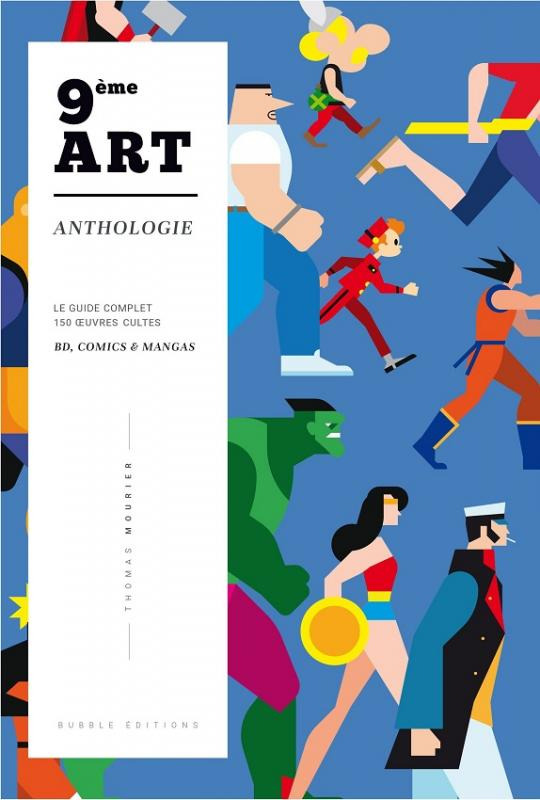
There is also quite a big debate over whether BD should be considered literature or not. It is primarily a narrative with prominent illustrations? Or is it primarily a visual art with some narrative stuck to it? What is more important, the drawing or the text? Is it closer to books or to paintings? Do we focus on the visual logic and the aesthetic, or the storytelling devices? It doesn't help that BDs come in a wide variety, from products very thick and heavy with text, to BDs without any text. From Boulet to Edgar P. Jacobs, from Les Cités Obscures to Blake et Mortimer...
Without going back to the Egyptians and their hieroglyphs, the class I took about the history of BD did point out how the roots of the "sequential art" in France could go back as far as the stained glass of churches, and the very famous Bayeux tapestry.


But the story of BD really begins with Rodolphe Töpffer, the man who is thought as the inventor of BD as a whole. You might know of him if you looked into the history of comics books because he is also thought of as the grandfather of American comics. What he wanted to create, first and foremost, was what he called "littérature en estampes" (literature in prints, literature by engravings). He was coming from the world of traditional books and novel-publishing, and thus had a very literary approach to it all. He wanted a form of literature where text and image would co-exist as equals, united for satirical and humoristic purposes. Because that was one of the main features of his work - to have caricatural characters, with exaggerated features, placed within comical situations.
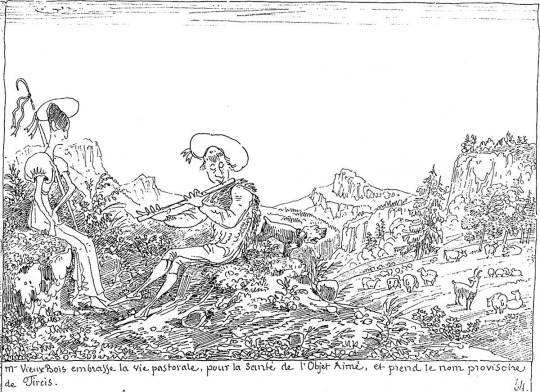


With Töpffer, we find a true "balance of the sequential art". Because the images are clearly dependant and "submissive" to the text, in terms of narration and storytelling, but in return the visual has a much larger part on the page and is what catches the eye immediately. As a result, we have a proto-comic which relies heavily on the text, but where the drawing is what makes it interesting in the first place - and the visuals are needed to appreciate what the text is saying - and these texts usually explore the logic of mismatching, discordance, and absurdity.
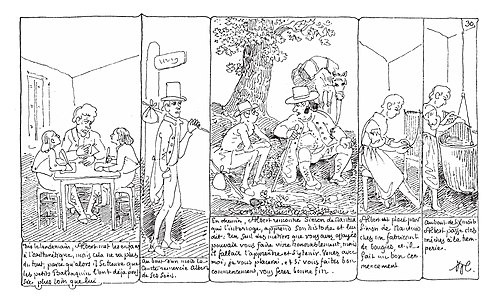

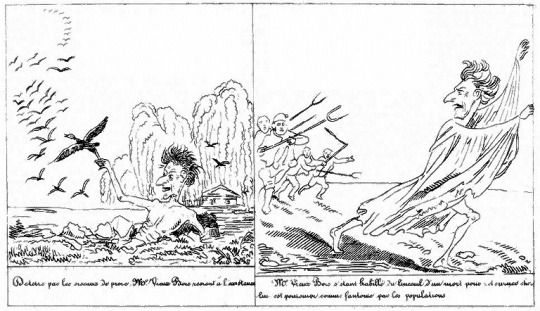
Töpffer's work spread throughout Europe, and even reached the USA... And yet never gained any fame. It was not a huge success, it was never a best-seller, in fact it sold in small quantities and limited editions. And yet, it still had a big influence over the various illustrators and cartoonists of the time, and gained a small celebrity in the world of caricatures. But for Töpffer to REALLY become famous and a public figure, we would have to wait for when people started studying the history of BDs and comics...
And what Töpffer changed, through his work, was the idea of these doodles and cartoons existing on their own. Given the development of comics always deeply relied on the developments of the printing industry, they rarely could exist "alone" - unlike text, printing comics required more machines, more supplies, more technique, more effort, and so they usually appeared as caricatures within daily or weekly newspapers, or as comic strips to illustrate a text, they appeared within places of recurring, regular publications that were however not their "own". The BD industry grew out of this logic of recurring, repetitive publications, and still kept a format of "serial". But Töpffer published his little comics on their own, within their own books, without anything else but them - they were sold for themselves. And that's how it changed things.
The BD also primarily began as a form of... "degraded literature", so to speak. It was seen as a storytelling form perfect for almost-analphabetical people and for people with reading difficulties - first of all being children. The BD fed from this concept developed in the 19th century of "youth-literature for young readers", this idea that children could have and deserved their own books separate from the readings of their parents (Jules Vernes notably played a big role in creating this "literature for children" in France). This, tied to how crude, fast-made and easy-to-reproduce the BD drawings were at the time, resulted in a general perception of BD as a form of "futility". BD was there for humoristic satires, funny caricatures, children publications. It can be compared to how the "mangas" were originally drawings of a "low", "mundane" daily-life, opposed to the "high" and "real" art of drawing landscapes.
And this initial "futility" explains a LOT about the history of BD and how it evolved. The first step of the BD history was to prove its "interest" and its "utility", by becoming a "useful" thing, by turning into a tool of pedagogy or a "good" form of entertainment. And once the BD became a legitimate, mainstream, mass-produced "classic" thing, then came a second era of counter-culture, where BD became more experimental and more mature, reaching out for an adult audience.
The "periodical" publication of BDs by "chapters" or "issues" was not truly preserved. Unlike American comics and Japanese manga, where the serial chapter-publication or the periodic-issues release is still a foundation of the industry, the BD industry ditched it all and relies rather on the publication of full "volumes" or complete "collections", as a full book with a solid cover. Before it is true that the income of BD creators came from the "perodics", with their work only being bound in a single volume, a "hardcover", as a "bonus" or a "reward" that confirmed the success of the series - but today BD relies almost exclusively on the publication of full volumes.
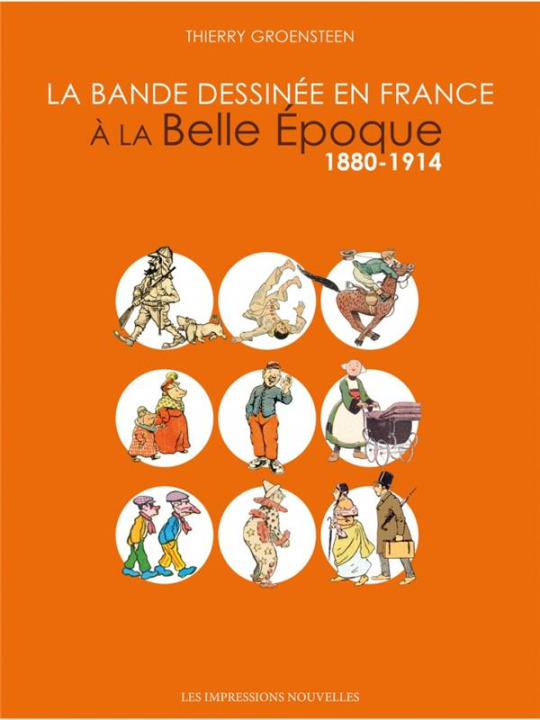
After Töpffer, the "littérature dessinée" (drawn literature) affirmed itself more and more, through satirical caricatures and humoristic tales. It never became the main production of artists - they were primarily illustrators or photographs, and they only did proto-BD as an aside. You had Cham, who took a lot after Töpffer, you had Nadar, who caricatured the mid-19th century politics, you have Gustave Doré too, yes THE Gustave Doré...

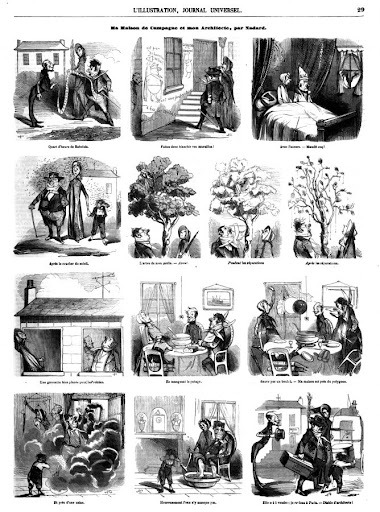
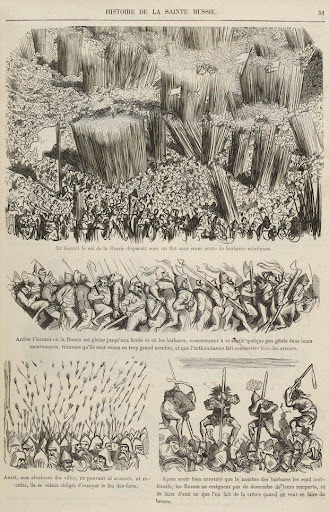
But the next big turn, the one that changed the "generic humoristic stories" into a "specific illustrated literature for children" was "La Famille Fenouillard" by Christophe, considered one of the first real BD of France (1889-1893). And again, we find here a specific balance between text and image. You have a LOT of text, that is a big dependance on the text - it is there that all the story takes place... But the drawings meanwhile are very attracting, very insisting, because they are incomplete scenes and visual enigmas that encourage the reader to check what they are about. The image attracts the gaze, creates the curiosity, the wonder, creates the question, whereas the text offers the answer. We are still in quite simple, not complex stories, but they play a lot on dichotomy - for example the drawings offering joyfull, happy, positive situations, that get more shady, more dubious if not dangerous once you add the text to them.


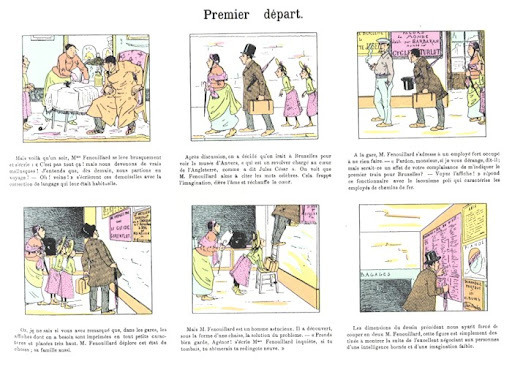

While I speak a lot of France, Germany has its own things going on aside - most notably, it developed what would become a very common genre in European BD, the "petits garnements" genre. Stories of brats, mischievious boys and little devils - such as the classic "Max und Moritz" (1865). This resulted in a wide fashion of duos or trios of prankster-heroes, that would create a lasting associated in culture between "childhood, youth" and "transgression, disobedience, trick". But here, we are closer to an illustrated tale rather than a "true" comic.
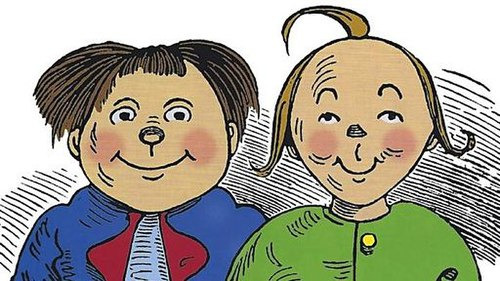

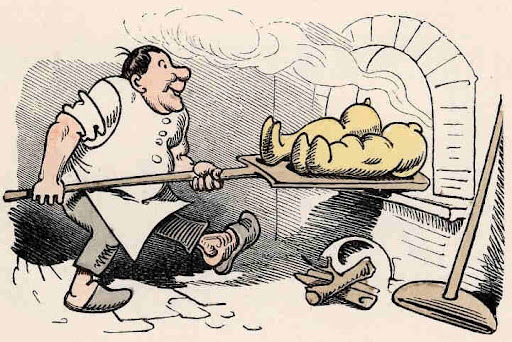
For more about the history of BD, see you in the next post...
#let's explore the ninth art#ninth art#bd#bande-dessinée#bande dessinée#comic books#comics#history of comics#history of BD#french history#france#french comics
21 notes
·
View notes
Text

went for a sort of Calvin & Hobbes dance with this one
#not from the suggestions box#this was the scheduled bit for this week#nimona#nimona art#ambrosius goldenloin#ballister boldheart#doodles#one-off nimona comics
240 notes
·
View notes
Text

Meet the artist!
•───────•°•❀•°•───────•
Finally I'm able to put some effort into giving myself a proper persona redesign. Pink and blue were fun but these new colors get me excited! Anyways time for a reintroduction!
•───────•°•❀•°•───────•
Name: nekoJAF / Neko / JAF (If you're quirky)
Hobbies: Scrapbooking, Shipping, Gaming with friends, Dancing around, Crane gaming, Roleplay
Favorite medias: Bakuman, Persona 4, Fantasy Life, Calvin and Hobbes, Undertale, and FNAF
Likes: Working, Gaggles of colorful girls, The power of friendship troupe, Pomeranians, Egg sandwich
Hates: Burrs and Goatheads, Poorly placed fanservice, Poorly made burgers!!, Lack of milk
Tools of choice: Samsung Tab S8, XPPen Artist16(Gen2), Clip Studio Paint
27 notes
·
View notes